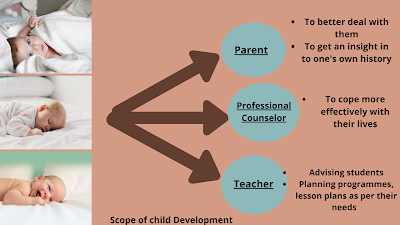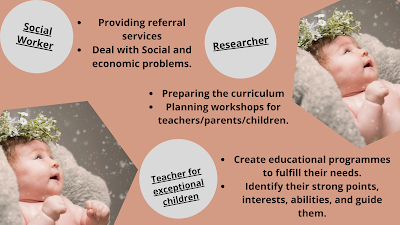Children are like buds in a garden and should be carefully and lovingly nurtured, as they are the future of the nation and the citizens of tomorrow,' said Jawaharlal Nehru.
Children are very important resources for any country. Children re not only the future of the country they are the future of mankind. They are the important pillars with whom one can build their future, so for making are future strong we need to make our pillar strong. They are the ones who are going to make the country strong and conducive places to live. So if we want to make our future strong so need to focus on the present as well. We need to focus on child's present, their growth and development, cater to their essential needs and prepare them for the future.
Meaning of Child Development
Child development is a specialized area of study which concerns itself with the growth and development of a child right from the moment of conception to adolescence.
The term development means a progressive series of changes that occur as a result of maturation and learning. development implies qualitative changes. This means that development does not consist of adding inches to one's hight or increasing kg in weight. These include changes in abilities like learning to speak, changes in behavior, interests, comprehensions, etc.
The term development means a progressive series of changes that occur as a result of maturation and learning. development implies qualitative changes. This means that development does not consist of adding inches to one's hight or increasing kg in weight. These include changes in abilities like learning to speak, changes in behavior, interests, comprehensions, etc.
According to Laura Berk, Child development is a field of study devoted to understanding human constancy and change from conception through adolescence.
Objectives of Studying Child development
child development is a part of the study of human development. Because the early years are important and are the foundation years in every child's life.
1- To study the overall development of children.
This is basically to know and understand how children develop. The students will learn the developmental patterns, developmental norms, aspects of development and needs of children and children's rights.
2- To become acquainted with developmental stages from birth to early childhood years.
The students will know the different developmental stages which cover infancy to adolescence and its characteristics.
3- To understand the various factors affecting the child's development.
Factors such as heredity, environment, family background, learning, maturation, nutrition, rest, etc. have a long-lasting effect on a child's development. One can be equipped with this information to enhance the development or help in promoting development in the right way and at the right time.
4- To understand the role of the adult in stimulating and promoting the overall development of children.
Parents, teachers, caregivers, and society play an important role in the development of children as children are totally dependent on adults for their needs, primary or secondary. To provide a stimulating, encouraging environment for children for their overall development is the key role of parents and adults.
Scope Of Studying Child Development.
The scope of any discipline depends on the depth of the studies, it's the development and how well it has been related to the environment around. Considering such issues, Child development though part of human development has a wider scope as a separate discipline. Since it directly dealing with human beings it has a wider scope which includes:-
1- Studying different stages of development.
The knowledge of this subject helps to study in-depth development from the prenatal period to the early childhood years. It tells us, how the entire life span has been divided into smaller units highlighting the pattern of development, characteristics of each stage, the milestone, the needs, etc. This would lead to promoting interest in further studies.
2-Studying various domains of development.
The different domains would include physical and motor, cognitive, psychosocial, moral and emotional. These are also known as aspects of development. The interrelation between these aspects highlights the importance of normal development and behavior.
3-Studying the factors affecting growth and development.
Heredity and the environment are the two main factors that affect a child's growth and development. This subject helps to study their favorable and unfavorable impact on the development. These factors play an important role in a child's development.
4-To make a career in the field of Child Development.
The basic knowledge about Child Development will be a foundation for further studies at a higher level. After studying various theories, experiments and new researches by various educationists, one gets the opportunity to pursue a career in this field. This career can be with normal children as well as with exceptional children as this provides a theoretical base. One can work as a professional in a wide range of settings and programs for children, youth and their families. This basic knowledge can facilitate entry in that field. This study can be a foundation on which further knowledge, skills, and competencies can introduce the basics of Child Development.
5-Useful for the would-be mothers and parents.
The knowledge of Child Development, how growth and development take place, etc. is very essential for the mother/parents/teachers. This subject covers prenatal to early childhood about which every mother/parent/teacher should have the knowledge. With the awareness about milestones at every stage, it is easy to distinguish whether the child is normal or exceptional. By studying the needs of children, and the child-rearing practices, it helps in fulfilling the responsibility as parents/teacher and they can guide children as and when required.










